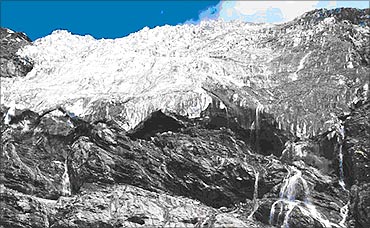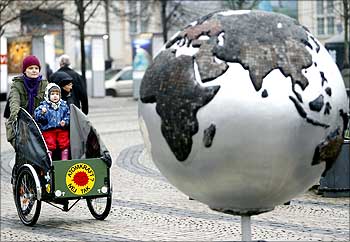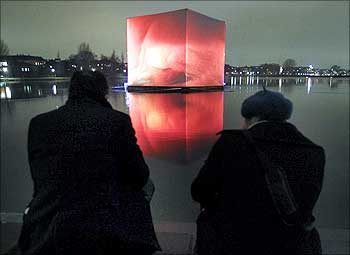Photographs: Courtesy, A study by V K Raina on Himalayan glaciers submitted to the Environment Ministry. Betwa Sharma in Cancun
As delegates struggle to arrive at a consensus on key climate change issues at the annual climate change conference in Cancun, the World Meteorological Organization has released a report which says 2010 is the hottest year ever recorded.
"The year 2010 is almost certain to rank in the top 3 warmest years since the beginning of instrumental climate records in 1850," WMO said in a report.
WMO, however, cannot make a final ranking for 2010 until the organization has factored in the date for November and December.
Over the 10 years from 2001 to 2010, global temperatures have averaged 0.46 C (0.82 F) above the 1961-1990 average, the report said.
. . .
2010 hottest year ever recorded
Image: An anti-Copenhagen 2009 climate meet activist.Photographs: Bob/Reuters
According to WMO, the recent warming has been especially strong in Africa, parts of Asia, and parts of the Arctic.
The report also pointed out several instances of extreme weather conditions in the summer during which Pakistan, experienced the worst flooding in its history as a result of exceptionally heavy monsoon rains.
"The event principally responsible for the floods occurred from 26-29 July, when four-day rainfall totals exceeded 300 millimetres over a large area of northern Pakistan centered on Peshawar," the report said.
"The most extreme heat was centered over western Russia, with the peak extending from early July to mid-August," it said.
. . .
2010 hottest year ever recorded
Image: A woman rides a bicycle past a globe in downtown Copenhagen during Copenhagen climate meet in 2009.Photographs: Pawel Kopczynski/Reuters
The United Nations Climate Change Conference 2009, also known as COP15, is being held at the Bella Center in Copenhagen from December 7 to December 18.
Photographs: Pawel Kopczynski/Reuters
Meanwhile, no breakthroughs emerged after day 3 of negotiations in Cancun where negotiators are seeking a 'balanced' set of outcomes, which should include progress on divisive issues like mitigation and financing.
The contentious climate meeting in Denmark, last year, yielded the non-binding Copenhagen Accord, which called on all countries to reduce greenhouse gases, 100 billion dollars in long term finance to developing countries and 30 billion dollars to short-term finance to the poorest and most vulnerable countries.
In 2010, 37 industrialised nations and 42 developing countries submitted mitigation targets and voluntary actions to reduce their carbon emissions.
. . .
2010 hottest year ever recorded
Image: People watch an illuminated so-called CO2 cube pictured in the water of St Jorgens Lake, Copemhagen.Photographs: Luke MacGregor/Reuters
Developed countries have already announced pledges of $28 billion for the fast track funding, according to the UN.
So far, delegates here indicated that progress is being made on issues like technology transfer and adaptation.
Meanwhile, the future of the Kyoto Protocol remains uncertain. Japan has already said that it opposes the extension of the Kyoto Protocol, which was signed in 1997.
"Japan will not inscribe its target under the Kyoto Protocol on any conditions or under any circumstances," its delegate, said in an open meeting of all the countries on Wednesday.
. . .2010 hottest year ever recorded
Image: A demonstrator protests during a climate change march in London on December 5, 2009.Photographs: Luke MacGregor/Reuters
While developing countries want to extend the only treaty that binds industrialised countries to reduce carbon emissions, Japan wants one treaty that should include legal obligations for emerging economies like China and India
The first commitment period of the Kyoto Protocol expires in 2012 by which rich nations committed to cut emissions by an average 5 per cent over 1990 levels.
However, US is not part of the Kyoto Protocol, which means that it would not have obligations to reduce emissions in the second commitment period, which is could potentially begin in 2013.
China and US are the largest emitters of greenhouse gases.






article